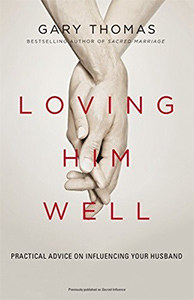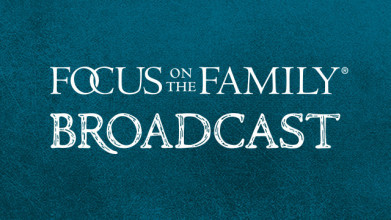Gary Thomas: The husband’s need really is for the strongest wife possible. That’s the best way to bless your husband to become strong in the Lord, to become strong in your character. The only thing you can absolutely change in your marriage… We talked earlier about influence. The one person you can change is yourself.
John Fuller: That’s an observation from Gary Thomas reminding women that you can have a really powerful influence on your husband and your marriage when you have a strong relationship with God. We’ll feature more encouragement from Gary today on Focus on the Family with Jim Daly. Thanks for joining us. I’m John Fuller.
Jim Daly: John, I’m thinking about that, thinking that probably works both ways for a husband to be the best husband, uh, draw closer to the Lord. Here at Focus, we hear from many women who are looking for some kind of change in their husbands and that can be a good thing or a bad thing depending upon your approach. And I’m so thankful for Jean, my wife and the influence she’s had to help me become a better man, a better husband and better father. It’s not always comfortable. (laughing) That’s fair. But she really does. She helps me to be better. Uh, she’s encouraged me and motivated me spiritually and she’s done the same for our two boys. Now, we also hear about wives who are dissatisfied with their husbands and may be trying to force them into something that they’re not or not yet. For example, I’ve said many times on this program that women need women friends, friends who can provide you with, uh, the extra emotional empathy that you need. You know it’s easy to get discouraged in your marriage hoping for a change that never seems to come. But Gary’s got some great insights for both husbands and wives that I think will really benefit your relationship if you put them into practice. And I’m looking forward to hearing more of his advice and encouragement today.
John: Gary Thomas has been a frequent and popular guest on this program. Uh, he’s an author and speaker and currently serves on the teaching team at Cherry Hills Community Church in Colorado. He’s written a book that we’ll hear more about today called Loving Him Well: Practical Advice on Influencing Your Husband. Check it out at focusonthefamily.com/broadcast. And now here’s how we began the conversation with Gary Thomas on Focus on the Family with Jim Daly.
Jim: Gary, this is perhaps the million-dollar question. I’m not sure. We may have a few million dollar questions in here. (laughs) But is it really possible to change a husband? (laughing) Let’s go there.
Gary: I like to use the word influence your husband. But we have to put it in the right context. Let me put it as a husband with his wife. If I try to turn my wife into a love-Gary-like-he-wants-to-be-loved machine, that’s the height of narcissism. But if I want to influence her so that she becomes all that God has called her to be in Christ, that’s a holy pursuit. It says that Christ loved the church and part of that was wanting to make her holy. So it is a good desire to see your spouse grow into the person God created them to be. It can be an evil desire if you’re trying to turn them into that love-me-like-I-want-to-be-loved machine. Motivation is everything here.
Jim: Right. The difficulty in that though is we are born in this world as selfish creatures. That’s the sin nature that we all possess whether you’re a husband or a wife.
Gary: Right.
Jim: So how, how do you get to the point where you can overlook or put a sunder those selfish attitudes and really look out for the best interest of your spouse?
Gary: I think it begins by dreaming with God about who he wants our spouse to be.
Jim: Hmm.
Gary: So it’s not just us. But we’re sitting at the feet of Jesus and saying, “Who do you want him or her to be as a worker, as a husband or as a wife, as a friend, as a son, or as a daughter and saying how do I participate with what you’re already doing in their life?” And, and you might be surprised God may take it into a direction. One of the things I, I mention here to just kind of give some perspective because someone might say, “If my husband was just a more committed Christian, life would be so much easier, it’d be more fun, it, it would be better.”
Jim: Now, you’re ticking off the list if he was, you know-
Gary: But, yeah.
Jim: … spiritually leading in our family.
John: He’d pick up after himself.
Jim: Right. (laughing) Okay, we got the list down, don’t we?
Gary: But, but then I use the story of John Bunyan who when he married his wife, his first wife died so he married her and he had several children already. He was put in jail for preaching the gospel without a license. And in those days when you were in jail, they didn’t feed you and they didn’t clothe you. If you didn’t have family that came and took care of you, you were in trouble. So here’s a young wife barely married, having to bring his food to the prison every day, having to care for his kids, and in fact because he wouldn’t stop preaching the gospel (laughs) he was in prison as much as he lived with her outside of prison. So it, it’s possible that supporting our spouse and who they would be in Christ can make life more difficult.
Jim: Yeah.
Gary: That’s why again we want to look at the motivations. It’s, it’s not about us. That’s narcissism, it’s about them being released to be the person that God created them to be.
Jim: Yeah. Let’s go back to the changing versus, the influencing. Um, what is the difference? Let’s be really clear about that. What is the attitude of, “I’m going to change my husband,” versus the attitude of, “I’m going to influence him”?
Gary: I believe biblical influence and here’s the challenge and the rub comes from setting the example. Paul says, “The stronger gives way to the weaker.” He says, “Follow me as I follow Christ.” Throughout the Bible, you see that the best way to influence someone is to be what you want them to be. Let that be contagious. Let it invite them into a new way of thinking. The best way for me to stop gossiping is when I see a person in a very holy way turn a conversation toward encouragement and blessing. I’m convicted. They never say, “What are you doing?” (laughing) Uh, they just go completely different way. I’m like, “Oh, yeah. That, that is better.” And so change… The danger of change is that things won’t change. I think it was John Gottman that said about 60% of the issues that bug a spouse will never change in a marriage. That’s why when you marry somebody, you marry somebody as they are. And some things won’t change. When I’m working with premarital couples, I, I go through this. So we’ll talk about what’s most frustrating or what not and some of those things I’ll point out, th- this will never change. This person will never care if they’re on time or not.
Jim: See, I must be an optimist when I hear you say that, I’m going, “Wow, 40% can change? That’s great.” (laughing) I mean, I’m all in. I’m thinking that’s fantastic.
Gary: That’s not the interpretation John Gottman was going for. (laughing) It was that there, there is a level of acceptance and there is a level… I think the best marriages we learn to accommodate that. And I, I see that now. Lisa and I are in the empty-nest years with a lot of couples that are in the empty-nest years and we’re, when we’re comfortable with each other and accepting of each other it changes the dynamic of marriage. You can rest a little bit in each other’s presence. That’s a much more pleasant place to be in marriage.
Jim: Here, here’s another big question, and seriously this is a big one. Um, what does God want for women in their marriages?
Gary: I believe what God wants for women in their marriages begins before their marriage recognizing who they are as God’s daughter, to receive His love, to receive His power, to receive His affirmation and gifts and pour that grace and mercy, and love, and courage out on their spouse first and their kids second. One of the things I stress, if you want to influence your husband, you have to take a step back and be influenced by God. You can’t influence somebody that you’re afraid of irritating. You can’t influence somebody that you’re afraid of making angry. So a woman needs to know that she’s affirmed by God every day that she matters not because her husband proposed to her, but because God adopted her, that she’s beautiful in God’s eyes not because her husband is still attracted to her, but according to Colossians 3:12, God chose her and loves her dearly, that she’s secure not because her husband still wants to be with her and is helping to contribute to the family income, but God said, “I will meet all of your needs.” You need that platform of security to reach out and influence someone because guys are influenced by people they respect. If I’m playing golf and another guy can barely break a hundred and he tells me I’m gripping my club too tightly, I’m like, “Who cares what you think?” I just saw your last-
Jim: And you’re really hitting me where it hurts. (laughing)
Gary: But I, I got the great opportunity to play golf one time with two professional golfers, Jonathan Byrd and Zach Johnson. And Zach says, “Gary, you’re holding your club a little too…” I’m listening. I mean, Zach knows what he’s talking about and so to be an agent of influence is to be someone who is receiving from God on a daily basis, because you don’t take the risk if your happiness, your sense of security, your sense of well-being depends on what your husband thinks about you at any given moment. Your husband is a fallen man and he might be angry with you when he shouldn’t be angry with you. He might be impatient with you when you didn’t do anything wrong. And so I, I would say His desire is for the, the woman to become God-centered first so that she could really be an agent of His love toward her husband.
Jim: Well, and again it sounds easy, straight forward. This is the right thing to do. This is what we talk about in terms as a Christian to be rooted in Christ and have a foundation of him for our identity. You’ve said that very clearly. But it’s really tough to put into practical, uh, you know, everyday life. And how do we prevent ourselves both husbands and wives from making marriage an idol? Particularly women, I think emotionally they’re expecting a lot out of this relationship at times more than husbands can deliver. I’m not letting husbands off the hook. I’m just saying this is reality.
Gary: Yeah. It it’s a great point Jim and here’s how I’ve avoided the idol. Well, h- how I push back against the making marriage an idol. I try to love my wife out of worship to her Heavenly Father. One of my goals I fall so far short of this every day, but it’s a goal. I’m aiming toward it is that I want God to say to His angels, “I wish other husbands would love their wives the way my son, Gary loves my daughter, Lisa.” I want to please God with how I treat Lisa. And so the way I keep from making it an idol, the way I keep from trying to turn Lisa into a love-Gary-like-he-wants-to be-loved machine is to please first my Heavenly Father. God are you happy with how I handled my wife in that situation? If she’s having a bad day, did I give her grace? Sometimes you just got to let somebody have a bad day.
Jim: That’s a great word picture.
Gary: I mean… Or does she need encouragement because maybe she’s being taken for granted by her kids or her friends. But it really is at the end of the day, “Lord, are you happy with how I loved Your daughter?”
Jim: Yeah, I agree.
Gary: And I think if that’s the attitude, I don’t know how it could ever be an idol because you’re serving the one true God by loving your spouse.
Jim: Gary, in your book, Loving Him Well, you have an observation of Napoleon Bonaparte (laughing) which when you think about it, I think a lot of military academies probably lean on him for military strategy and genius, not so much for marriage advice. Um, how did his relationship with his wife catch your notice?
Gary: Well, as, you know, Jim, having read through it, Napoleon Bonaparte can teach us what not to do.
Jim: (laughing) In so many ways.
Gary: As much as what to. He was a narcissist of the highest order and he was vicious at times to his wife when she showed weakness. He said, “I need you to be strong. The, the empress needs to show her strength.” But what we can learn from that is that the husband’s need really is for the strongest wife possible. That, that’s the best way to bless your husband to become strong in the Lord, to become strong in your character. The only thing you can absolutely change in your marriage… We talked earlier about influence. The one person you can change is yourself. And as you change yourself, you bring blessings into your marriage. And you can learn, “You know what, how do I learn to respond to an impatient husband in a holy way?” How, how do I learn to dissipate my husband’s anger? You’re not excusing his impatience, you’re not excusing his anger, but you’re learning how do I become stronger myself so that I can handle it? What amazed me is that no one is ever been as holy as Jesus and yet no one was ever let down or taken for granted, or assaulted, or attacked, or maligned more than Jesus was. And yet he never had this poor-me attitude. It, it’s just amazing how because he was so centered in who God is, he was strong enough. So again, the platform for influence is strength and that’s what I, I think husbands look at. I don’t- I hate to talk in stereotypes because every marriage is its own story. But since I get together with guys a lot, they love to brag about their wives. They look-
Jim: Absolutely.
Gary: … they look up to that. And, and it might be different things. She might be a great athlete. She might be great with money. She might be a great law- lawyer. She might know her Bible backwards and forwards. She just might be so social, you know? And if the husband particularly is a big introvert that, that can be a big thing. But ultimately I, I think that’s what you’re looking at. As you seek to influence your husband, say, “What am I bringing to the equation here?” Because it’s never… You don’t want to get to the point where “Our marriage will be better when you get your act together.” It’s always got to be the both-and: “I’ll improve my marriage when I improve me.”
Jim: But let’s highlight that because that’s an easy way for our flesh to take us. And when you get your act together, then we’ll be a better couple because my act is already together. What about for that woman? And I’m, I’m sensitive to this for the woman who is trying hard. She’s the wife that has been doing some of these fundamentals that we’ve talked about in, in the first part of the program here. But there is that feeling like I’m the only one putting effort into this. So speak to that woman who says, “Okay, Gary. I hear what you’re saying. You know, I got to be the best me I can be in Christ. But man, I’ve been doing that and it still ain’t there.” Excuse the grammar.
Gary: Let me make a distinction here Jim because I think it’s important. I do believe as painful as it is for me to say this that there, rather than trying to save some marriages, there are some marriages that women need to be saved from. In the case of real abuse or dangerous situations. Um, I don’t want a woman to hear this and say, “Okay. I just need to, to focus on myself.” So let’s, acknowledging that but I-
John: Good distinction, yeah.
Gary: I, I interviewed, um, a number of women. One of them was a woman that I, I think it’s similar to the type of woman you’re describing. Her husband was so uninvolved at home. It was so frustrating. He was always fishing and then she kept talking. He says, “Well fishing season is almost over.” Forgetting to tell her that hunting season comes right after (laughs) fishing season. And then he was so involved in work. And she was so disappointed, she said, “I, I’m ashamed to admit this, but I found myself praying, ‘Lord, I hope he’ll have an affair or die, so there’s a Biblical way out.'” She saw-
Jim: Wow.
Gary: … no way for her marriage to be improved or saved. And she was just miserable. But as a committed believer she felt like, “Well, I don’t have a reason to leave. He’s not abusing me. He hasn’t been unfaithful.” And she prayed through it and this will seem severe to some, so I just want to acknowledge that as we go in. She came up with what she called the magic question and it was a shock. She went, he came home and she said, “What do you want me to do for you that I’m not doing?” She hated asking that question. She pushed back with the Lord saying, “He should be asking me that question. There are a dozen things he should be doing that he’s not.” And his answer made her even angrier. He said, “I want you to be in a better mood when you get home.” And she (laughs) said, “Look, ask me to do more laundry, ask me to paint the house, ask me to replace the roof, don’t ask me to be in a better mood. If you had my life you wouldn’t be in a better mood either.” But she realized, “You know what, I make him pay for my frustration. Every time he comes home, I let him know how unhappy I am, how frustrated I am with everybody.” And so she said, “Okay, I just… God put this in my mind, I’m just going to try to do it.” And she did it. And then she asked him again, and, and he gave her something else that had to do with the kids. And at first, again, she was, “You’re the absent father and you’re telling me how to be a better mother?” But what he said was true and it renewed her relationship with one of her daughters in particular. She had a blind spot. And that’s just what we always have to remember. Just because our spouse is wrong, doesn’t make us right. You can be wrong in a hundred different direction you can miss a target, north, south, east or west but that doesn’t mean because somebody’s hitting it north you’re not missing it south. And then what happened when she began to make those changes her husband came along and he began to change as well. I actually just heard from her last week. They’re celebrating their 44th wedding anniversary. She said, “It’s never been better.” And so it’s going back to this that you’re the easiest person to change. And, and for her, again, I know some women they are going to hate me till their dying day, that I even recorded (laughing) the magic question. And I’m not going to suggest this works in every marriage. But it was a bold experiment that for her paid big dividend. She just said, “I’m so frustrated with him. I’ve colored him by my disappointment. I’ve defined him by what he isn’t and it was just this process of calling him forward that when he began to see that, she lifted him up as well. And it doesn’t sound like it makes sense but a lot of times the best way to lift up a family member is to lift up ourselves first.
Jim: No, that’s good. I want to make sure people hear clearly what the magic question is so just repeat that again.
Gary: What do you want me to do for you that I’m not doing?
Jim: Yeah. Make sure you get that right. It’s not what you can do to make me feel better (laughing) so that’s important. Uh, Gary, women can get frustrated with their husbands because their husband has something you call functional fixedness. What is it and how does it typically play out in a marriage, functional fixedness?
Gary: I want to give the credit here to Dr. Melody Rhode. She’s the one that introduced me to the idea. She’s seen it with a lot of couples. But functional fixedness in a sentence is this, it describes a husband who isn’t motivated by your pain. He’s only motivated by his pain. It’s a spiritual immaturity but here’s where wives miss it if they don’t understand what’s going on. They keep expressing to their husband, “This hurts me. This frustrates me. This is confusing. Would you please stop doing it?” And then they’re doubly hurt when he knows it hurts her and he keeps doing it. He knows it frustrates her and he keeps doing it. And so she thinks, “I got to find another way to express it. How do I help him understand it?” The challenge isn’t that he doesn’t get it, the challenge is he’s not motivated by her pain. He’s only motivated by his pain. Now, let me say a mature, godly man would be motivated by his wife’s pain. Not every wife is married (laughing) to a mature godly man. His discipleship if he is a believer it hasn’t reached to how he’s treating his wife. And so it’s recognizing that rather than always trying to make him understand that this frustrates me, if I know he’s only motivated by his pain, I have to start letting him face the consequences of his actions rather than rescuing him for those consequences because he’s not going to be motivated if it hurts me, he’s only going to be motivated if it hurts him.
Jim: And what does that look like? What are appropriate consequences in that context?
Gary: If she’s nervous, because let’s say the family budget is being blown every month. Uh, he’s got a hobby that’s out of control or something and she’s told them, you know, “We’re living on credit cards at this point. That’s not good enough.” And then she finally says, “Well, I guess we have to cancel cable or something.” Then he turns it on and they don’t have cable. And she’s not doing this in a passive-aggressive way, but saying, “We agreed.” And I, I would recommend you setting this up, you know? You go to a Dave Ramsey seminar or something or you agree, we’re going to live within our means. And if we do that, just say, “I didn’t know what else to cut.” Or you’re serving Top Ramen three nights in a row or something, but you’re just saying, “We agreed to this and this is a situation you put me in.” But you’re just realizing, “Okay, he’s responsible for what he does. I still need to be responsible for others and it’s letting him face the pain of what he’s doing.”
Jim: There’s a couple of reactions there, one is for the woman who feels, “That’s like I’m raising another child. I mean you’re really putting me in a spot where I’ve got to give that much thought to this.” But there’s also that passivity that can occur that, “You know, I, I don’t want the conflict.” I mean, so they don’t they can’t muster the courage, I guess it would be to put that pain grip on their husbands to get their point across. So h- how about that woman that’s a little more passive, what would you say to her, “Well, the home is peaceful, Gary. I, I mean I’m just sucking it up and it seems to work.” Why is that a destructive attitude?
Gary: Because God created men and women to rule. That’s clear in the book of Genesis. It said male, speaking to male and female, that they to rule. There are 39 active verbs in the first chapter of Genesis describing God. God is an active God and he calls his people to be active. And so it’s rather than just being passive and letting things happen… H- here’s another example. She’s passive and her husband is saying hurtful things or, or even scaring her and, because he doesn’t know how to handle conflict in a healthy way, it’s fine for a woman to say, “I can’t talk to you when you’re like this. I’m going to go to the other room. When you cool off and we can talk in a healthy constructive way, we’ll have this conversation. I’m not running away from you I’m not running away from this issue. But I can’t talk to you when I’m treated this way or disrespected this way.” You’re just letting him face the consequences. If he wants to find out a way to communicate to you, he has to figure out a way to communicate that is healthy. That’s not treating him as a child, that’s really just treating him as adult who’s responsible to respond in an adult way.
John: Some good insights about marriage from Gary Thomas on this episode of Focus on the Family with Jim Daly. And, Jim, I think Gary’s words have really encouraged a lot of couples. Uh, he’s motivated us to improve how we interact with each other and he’s challenged us, uh, if we’ve gotten a little complacent about the relationship.
Jim: Well, that can happen and that’s why we’re addressing the topic today. Uh, here at Focus on the Family, we want to equip you with good tools to move forward in your marriage, not backward, uh, because, you know, one important aspect is the world is watching. They want to see if we as Christians can really love each other well and live out our faith every day. Probably more importantly, your kids are watching, whatever age they might be. And the witness of your strong and healthy relationship can actually draw people into God’s Kingdom. That’s a very compelling thing to think about. Of course, we know there are husbands and wives listening right now and your marriages, uh, maybe struggling. Maybe you’re considering even separation or maybe divorce. If that’s you, can I urge you to contact Focus right away? We have so many great resources and practical help for you like our Hope Restored program where we provide intensive counseling over several days for couples who are basically ready to call it quits. But 80% of those couples who go through Hope Restored, their hearts are changed by God. And two years later we go back to interview those couples and 80% are still together and doing well. That’s incredible.
John: It really is remarkable. Uh, what a program. Hope Restored, uh, has made such impact, generational impact. And in fact when we recorded this interview with Gary Thomas he had an observation about Hope Restored.
Gary: And I want to give a, a pass’s response to Hope Restored because I’ve worked with a lot of marriages and I found sometimes people say, “Well, we tried counseling and it didn’t work.” But if you reach a certain level of your marriage where you’re in contempt or just patterns that you can’t get out of, one hour a week marital counseling just doesn’t work. You’re past that. And I, I’m so believe in these intensive. They’re sort of a new thing that’s come about in the last decade and it’s so encouraging. I’ve sent so many couples there because you just need the time to get in, to dig in, to deal with the issues and to really work on your marriage. I’m so supportive of Hope Restored and all that it does.
Jim: Well, I can’t think of a more ringing endorsement than that. Um, your marriage is worth it. Get the help you need today. Contact Focus on the Family. That’s why we’re here. Don’t be embarrassed. Uh, we want to provide you that hope and to give you Godly help and counsel for a better future.
John: Our number is 800, the letter A and the word, FAMILY. 800-232-6459 or find help at focusonthefamily.com/broadcast.
Jim: And let me invite you to be part of the ministry. I mean, reaching out and touching, uh, marriages in this way and that’s just the tip of the iceberg. What we’re looking for are monthly givers who believe in marriage and want to help the couples we’re just talking about. Do ministry through focus by giving monthly so we’ll have the resources and staff in place to help more than 170,000 hurting couples like we did just last year. 170,000 people contacted Focus, uh, looking for that help. And if a monthly gift is more than you can afford right now, we understand that. If you can make a one-time gift, that will be great. And let me tell you, this accrues to your account in Heaven. I mean, this is where we’re working together. All I can do is let you know is what we’re doing and the need to keep it going, and to reach more people. And that’s what we’re trying to do. If you can help, uh, financially, we will send you a copy of Gary’s book, Loving Him Well: Practical Advice on Influencing Your Husband as our way of saying thanks for being part of the solution.
John: Mm-hmm. Our number once again, 800, the letter A and the word, FAMILY or donate and request that book, Loving Him Well at focusonthefamily.com/broadcast. On behalf of the entire team, thanks for joining us today for Focus on the Family with Jim Daly. We’ll continue the conversation with Gary Thomas next time. And for now, I’m John Fuller inviting you back then as we once more help you and your family thrive in Christ.






















